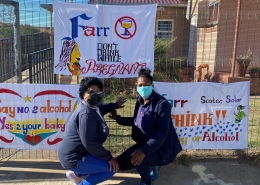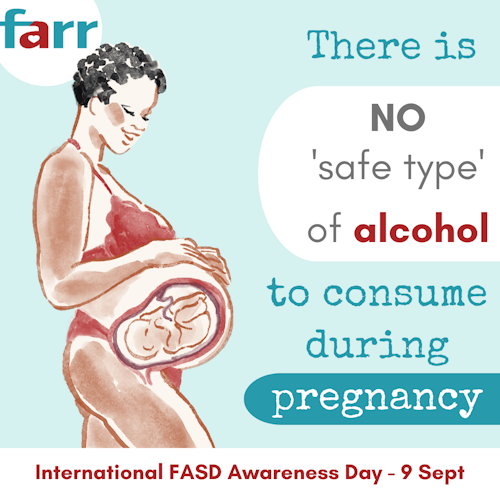The FARR Resource Library
Over the years FARR have collected a large amount of information and resources that we are able to share with interested parties. Should you require any furhter information regarding FARR and/or FASD, you are welcome to contact us on: info@farrsa.org.za or 021 686 2646
More Information
General Information
Globally, FASD is the most common preventable form of mental- and physical disability. The damage caused to the developing fetus by alcohol exposure during pregnancy, is permanent and irreversible. The burden of FASD on our society is being ignored despite the fact that it is far-reaching (socially and financially) and completely preventable. It is estimated that in the United States, FASD costs $6 billion (approximately R42 billion) annually and the average cost to treat a person with FASD for life is $1.4 million. The estimated burden of FASD in South Africa has not as yet been calculated, but is being investigated. The full impact of FASD in South Africa is immeasurable when it is estimated that at least 28% in specific communities may have FASD (according to research undertaken by FARR). Being affected with FASD has far reaching and costly implications for the individual and the family, community and country. The diagnostic costs and the management of the primary disabilities are immense. If undetected and untreated many individuals with FASD present with secondary disabilities such as mental- and other health problems, substance and other forms of abuse, consequences of risky behavior and conflict with the law. It is therefore extremely difficult to calculate the cost of this condition which is already affecting thousands of South-Africans. In the light of this, it is apparent that all efforts should be put in place to raise awareness about the harmful effects of alcohol use during pregnancy and need to prevent children from being born with FASD.

When a pregnant mother consumes alcohol, so too does her unborn baby. Alcohol consumed by a pregnant woman, is carried via her blood circulation system, through the placental tissue that separates the mother and baby’s blood systems, delivering the alcohol directly to the developing tissues of the fetus. Alcohol is especially devastating to the brain of the developing fetus, as alcohol easily crosses the blood-brain barrier.
Alcohol can damage the developing fetus throughout the entire pregnancy and the damage caused is not isolated to any particular stage during pregnancy. The severity of FASD depends on the quantity and timing when alcohol is consumed during pregnancy, together with numerous other factors such as: the mothers’ body mass index and overall health, age, food consumption at the time the alcohol was ingested, genetic predisposition, other substances such as smoking, etc.
There is no known risk-free amount of alcohol a pregnant woman can consume without increasing the risk of damage to the developing fetus. All women who consume alcohol while pregnant are at risk of having a baby with Fetal Alcohol Spectrum Disorder (FASD). Research indicates that even light consumption of alcohol during pregnancy can harm the unborn baby. Moderate to heavy alcohol consumption, especially binge drinking, is associated with a higher risk of having a baby with FASD.
Heavy alcohol consumption is defined as an average of about two standard drinks per day during pregnancy and/or 14 drinks per week. Binge drinking is defined as at least 5 standard drinks on any occasion.
Of all the substances of abuse, including heroin, cocaine and marijuana, alcohol causes the most serious lifelong neurological and physical damage to a developing fetus.
Fetal Alcohol Spectrum Disorders (FASD) is an umbrella term, which includes all possible disorders associated with prenatal alcohol exposure.
Fetal Alcohol Syndrome (FAS) is the most severe form of this disorder and the leading cause of preventable mental disability in the world.
The following features should be present for a diagnosis of FASD (by a trained Specialist medical practitioner, using the standardised scientific assessment tools developed by national and international FASD specialists:
Small head size
Growth retardation before and after birth(height & weight)
Intellectual disability
Specific facial features such as long, smooth, upper lip, small openings of the eye (called palpebral fissures), etc.
Organ anomalies e.g. heart defects
In addition, individuals with FASD may present with a variety of learning, behavioral and psychological symptoms without having any physical abnormalities.
Resources
Academic Publications by Prof. Denis Viljoen:
DenisViljoenPublications_Dec2011.pdf
Post Graduate Research in FASD
If you are a university student and you are considering post-graduate research in FASD, please email us at: info@farrsa.org.za.
Sundry Publications
- Alcohol Consumption by Pregnant Women in the Western Cape.pdf
- A Practical Clinical Approach to Diagnosis of Fetal Alcohol Spectrum Disorders.pdf
- The Effect of Brief Intervention on the Drinking Behaviour of Pregnant Women in a High Risk Rural South African Community: A Cluster Randomized Trial.pdf
Refer to list of FARR publications
White papers:
National Drug Master Plan February 1999
An Overview of Health and Health Care in South Africa 1994 2010:
Priorities, Progress and Prospects for New Gains (A discussion document commissioned by the Henry J. Kaiser Foundation to help inform the National Health Leaders Retreat, Muldersdrift, January 24-26 2010) HM Government, United Kingdom: Healthy Lives,
Healthy People: Our strategy for public health in England, 30th November 2010
Liquor Acts
South African National Liquor Act (No 59 of 2003)
Western Cape Liquor Act, 59 of 2003
National Human Genetic Guidelines: Contact the Department of National Health (Human Genetics Division) on: 012 312 0000
- National FASD policy: Contact the Department of National Health (Human Genetics Division) on 012 312 000
FARR training – click here to read more.
In the Media
The following section outlines articles and press releases about FARR and FASD:
2011:
WHO Bulletin: Fetal alcohol syndrome: dashed hopes, damaged lives
Press Release FARR FAStrap
BizCommunity: 25000 Babies born with FAS annually in South Africa
Media statement by Helen Zille, Premier of the Western Cape, on Government substance abuse strategy
2016:
Cape Times: Study reveals SA’s ‘crisis’ due to alcohol
Cape Times: Geneticist wins award
City Press: When I…
City Press: The war on drugs
City Press: PE schools remain closed
Die Burger: Kinders met FAS kos die straat
Die Burger: Weskaapse leerlinge drink
Die Burger: Wynbedryf erg onstig
Die Burger: Robertson Wynberf doen meer skade
Die Son: Drank babas dis n krises
Die Tyger Burger: Gedenk FAS dag
Echo: Geen hoeveelheid alkohol
Echo: FARR Open Day
Mail Guardian: It could also happen to you
Netwerk 24: Kinders met FAS kos staat miljoene
The New Age: Pregnant women cautioned
The New Age: Alcohol abuse by mothers-to-be
News 24: No amount of alcohol is safe during pregnancy
Northern News: Support Group
The Herald: Heartbreak full classroom
The Herald: Schools become war zones
The Herald: Martins case unlikely to see
Weekend Post: Helenvale gang violence
Weekend Post: Nora Nginza critical condition
Weslander: Hopes positive message remains
Witzenberg Herald: FARR neem die voortou in Phillipstown
IOL Online News: SA’s FAS statistics
IOL Online News: FAS fails to dampen Tisha
2017:
Quicket News: The Imhoff Crush
Die Tyger Burger: ADHD screening clinic launched
Die Tyger Burger: Protect your unborn baby
Algoa News: EC to unveil Provincial Drug Master Plan
Die Son: O-Kapenaars is te lief vir drank
Mail and Guardian: Prenatal alcohol exposure impacts brain function
RNews: Provincial drug master plan for the Eastern Cape
RNews: International Fetal Alcohol Spectrum Disorder (FASD) Day
SABC News: Men cautioned over foetal alcohol syndrome
Checkers Website News: Foetal Alcohol Syndrome
News 24: There may soon be a cure for foetal alcohol syndrome
SA Breweries Website News: Protecting the innocent
All Africa Website News: MEC Albert Fritz Launches Epwp Initiative to combat fetal alcohol syndrome
Cape Times: Partnership trains youth to fight foetal alcohol disorder
Sunday Times: Silence to highlight dangers of drinking while pregnant
Eyewitness News: Western and Eastern Cape record highest number of babies born with FAS disorder
Eyewitness News: SA records highest number of FASD cases in the world
George Herald: Your unborn baby drinks with you
Huffington Post: Fetal alcohol syndrome is a real crises in South Africa
In The Journals: Nearly eight in 1000 infants worldwide born with fetal alcohol spectrum disorder
PressReader Website News: Prenatal alcohol exposure impacts brain function
The Herald: Call to combat foetal alcohol spectrum disorders
Dorps Koerant: FASD International foetal alcohol spectrum disorder day
Eastern Cape Liqor Board Online News: FASD research and prevention project
Cape Argus: New initiative to tackle foetal alcohol spectrum disorder
Cape Argus: Alcohol is bane to your unborn kids
Psychiatry Advisor Online News: Foetal alcohol spectrum disorders
2018:
CTICC join forces with Community Partners,
GEMSBOK 29 Junie FASTRAP in Upington,
Rapport 09 September – Sirkel van armoede as tieners ma word,
Cape Times 07September 2018 – FASD a 20 year journey,
die Burger 11 Des 2018 SA kan nie trots wees op die syfers nie.
2019:
Prince Albert Vriend: Geen Alkohol tydens Swangerskap
2020:
Prince Albert Vriend: Vetplantjies
Die Son: FASD in die kollig
Die Echo: Community study calls for creative thinking in Covid-19
Die Echo: FARR and beyond
Gemsbok: Bewusmaking van FASD op Upington op n baie spesiale manier
A Commercial Feature: September 9 – International Fetal Alcohol Spectrum Disorder (FASD) Day
2021:
Prince Albert Friend: February publication
Prince Albert Friend: March publication
Prince Albert Friend: April publication
Trouw – Dutch Newspaper publication: April publication
Prince Albert Friend: May publication
Press release: 2021 Press release 2 Why 9 September (and FASD Knot) 30 Aug 2021
Press release: 2021 Press Release International FASD Day – 9 September
Die Echo: FARR Burgersdorp HMHB Baby Shower
Die Echo: Better Together in Difficult Times
Die Echo: Britstown staan saam teen FASA (pg.8)
Die Echo: FARR Heritage Day (pg. 3)
Die Echo: Join FARR’s social media drive
Gemsbok: FARR se gesonde moeder gesonde baba werp goeie vrugte af
Noordkaap Bulletin: No alcohol while pregnant
2022:
Gemsbok: Internasionale FASA-dag herdenking
Prince Albert Friend: November publication
Aliwal Weekblad: FARR Burgersdorp hosted an art competition
Die Echo: A Journey of hope together
Die Echo: FASD day celebrated in September
Die Echo: Saamstaan teen FAS
Die Echo: Seminar for professionals
Gemsbok: FARR gee opleiding op Keimoes
2023:
Gemsbok: Internasionale FASA-dag (pg.9)
Graaff-Reinet: Fetal Alcohol Spectrum Disorder highest in SA
Prince Albert Friend: March publication
Prince Albert Friend: July publication
Prince Albert Friend: August publication (pg. 24)
Prince Albert Friend: September publication
Prince Albert Friend: October publication
Trompsburg’s Voice: International FASD day commemorated in Trompsburg
Weekend Argus: International FASD day 9 September
Daily Maverick: SA needs more programmes to address foetal alcohol spectrum disorder, say experts
Daily Voice: International FASD day 9 September
Die Courier: 9 September
Die Echo: 9 September
Die Echo: A succesful international FASD day campaign for FARR
Die Echo: Beyond all limits
Die Echo: Bringing hope to the Britstown Community
Die Echo: FAStrap en Think Twice in die gemeenskap
Die Echo: Internasionale FASA dag
Die Echo: International FASD Day in Britstown































